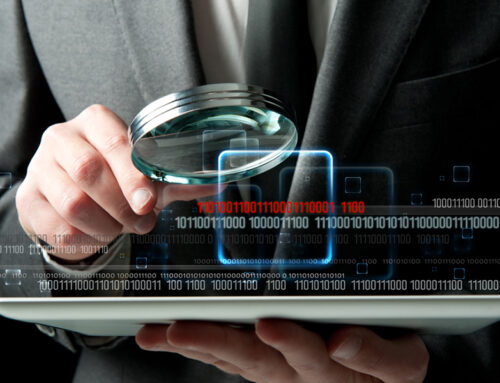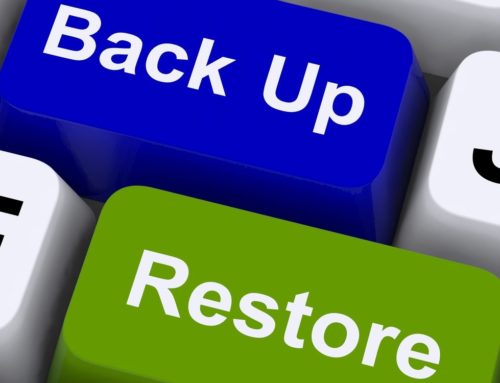Data security is becoming increasingly more important with every year that passes. As digital transformation takes hold, practically every company holds sensitive data about customers, employees and vendors. Not only can data breaches allow hackers to gain access to this data, but poor security and training measures could cause your company to lose data.
Whether it’s stolen or lost due to file corruption, human error, damage or laptop theft, there are steps you can take to protect data. Keep reading to learn more about what causes the loss of important data and how to keep your company’s data secure to protect internal systems from a data breach.

What Causes Data Loss?
Understanding what causes business data loss is essential for protecting system files, intellectual property, sensitive information and other important files. Let’s look at the main causes of lost data.
Human Error
The most common cause of data loss is user error. Even the most skilled worker is prone to making mistakes, such as:
- Posting private information to the wrong people
- Deleting files they weren’t supposed to
- Sending secure data to the wrong person via email
- Loss or theft of paperwork containing corporate data
- Improper disposal of hardware or software containing crucial data
- Loss or theft of an unencrypted computer system
Issues With a Computer’s Hard Drive
The primary data storage device for any computer is its hard drive. Next to human mistakes, hardware failure is the next most common cause of data loss. Most failures are a result of mechanical failure, but misuse is another major cause. External factors that can cause hardware malfunctions include:
- Fire or water damage
- Overheating
- Power surges or outages
- Exposure to magnets
- Impact
There are also internal factors that might cause a hard drive to fail, such as:
- Software corruption
- Data corruption or file corruption
- User error
- Drive read instability
In addition to the above, some hard drive failures occur slowly over time. Keep maintenance logs and ensure hard drive performance is monitored so you can catch a failing hard drive before data loss occurs. Some signs of a dying hard drive include:
- Cyclical screeching, grinding or clicking sounds
- Repeated hard drive crashes
- More bad sectors during chkdsk scans
- Boot-up issues
- Unusually hot devices
- Slow performance during standard processes
- Corrupted or disappearing files and opening failures
- Repeated freezes requiring hard reboots
Poor Security Practices
Viruses, spyware and malware pose major data loss risks. Email-based attacks, phishing and other threats have the power to steal, destroy and encrypt data and could potentially infiltrate your entire system or completely corrupt computer hardware.
With more e-commerce sites, CMS systems and apps in use than ever before, hackers know there’s a wealth of opportunities for theft and cybercrime. If you don’t engage stringent security best practices and actively maintain them, you risk leaving your customer data and other sensitive company information open to hackers.
Computer Theft or Data Theft
With an increasingly mobile workforce, people have more company phones, tablets and laptops than ever. While in the past managers and executives used to be the only people to get company hardware to take home, practically everyone has access now. This might be great for productivity, but it’s a huge risk with regard to potential data loss.
If employees leave portable devices unattended, they cry out for a criminal to come and steal them. And while replacing a company laptop or phone is an inconvenient cost, the price of having all your data lost or breached is much higher.
Physical Damage
Everyone knows electronic devices and liquids don’t mesh well. Despite this, many companies encourage employees to drink tea and coffee while they operate computers. You should definitely ensure your team is suitably refreshed at all times but provide areas for people to take breaks away from computers to prevent data loss as avoidable as that caused by spilled food and drink.
Power Outages
Natural disasters or problems with the grid could lead to power outages, another leading cause of data loss. A power surge or outage could cause a computer to unexpectedly shut down. Operating systems are highly complex, and shut-down procedures exist to protect processes. If devices don’t shut down correctly, your computer could break and all data held might be lost.
Plus, frequent hard reboots and power outages can significantly reduce a hard drive’s lifespan. Each time a computer restarts without being shut down, it resets the read and write head to its original position, causing small imperfections on the disk. Over time, this increases the likelihood of a head crash — which destroys the entire hard drive.
Data Loss Prevention Strategies
When it comes to how to prevent data loss in a company, you need to take a multipronged approach and actively maintain it on a regular basis. To improve data security, implement the following steps as part of a disaster recovery strategy for your business.

Study Business Data and Government Regulations
The first step to prevent data loss is to conduct a data sweep and assess the types of data your company collects and how sensitive it is. Using this information, check that you’re updated and compliant with current government regulations, which are changing rapidly.
Compliance alone doesn’t guarantee safety, but regulations exist to promote safety in an increasingly digital landscape.
Outline a Data Recovery Process
It’s vital all businesses that keep sensitive data have a disaster recovery plan. This should involve instructions on how to back up and encrypt data, include security policies for all devices and outline steps to take in case of a data breach.
It shouldn’t just be a plan that outlines how to react to data loss but should also include all the preventive measures to take in the unlikely event you need to start from scratch.
Have Backup Data
Backing up data is one of the most important ways to defend against problems. If you have strong backups, it doesn’t matter if you’re attacked by a hacker or a computer breaks — the information is safely stored.
You should have a clear backup and recovery plan as part of your overall disaster recovery process. What’s more, you need to keep track of your backup solution to ensure it’s working effectively.
Data Encryption
Encryption is vital for preventing malicious attacks in case a bad actor does get access to sensitive information. Strong encryption protocols make it nearly impossible for unauthorized personnel to gain access to your company’s data.
Hide Sensitive Information Behind Strong Passwords
All networks and accounts containing sensitive data should be password-protected and have two-factor authentication enabled. You should also make it a company policy that employees use only strong passwords and provide clear guidance on what this means and how to safely store passwords. Two-factor authentication means a second set of codes sent to an authorized device is required before access is granted.
Use Antivirus Software and Malware Protection
Your firewall and antivirus software are imperative for preventing data loss. Malware and viruses make it possible for hackers to steal information by infiltrating networks and hard drives. It’s not just your company’s data that’s at risk; it’s also your employees’, vendors’ and customers’ data.
If you have bank details, addresses, phone numbers and other sensitive information, the impact of infiltration by virus or malware could be catastrophic. It’s crucial that you choose the right software and maintain it regularly to prevent issues in the future.
Plan for Power Surges
A power outage could cost your entire network if the necessary security measures aren’t in place. Having a backup power supply could protect against data loss resulting from improper shutdowns. As a bonus, having a backup power supply also defends your company against lost revenue resulting from downtime.
Patch and Update Software
Patching and updating are vital for protecting business operations against data loss. Cyberattackers are poised to spot vulnerabilities and exploit them to get hold of profitable data. These practices ensure you have the most up-to-date security measures in place and known vulnerabilities are fixed.
Maintain Equipment and Records
Simply maintaining equipment and keeping records is an element of protecting your company against data loss. Using fans to cool equipment prolongs the lifespan of your hardware. Plus, keeping every computer clean and documenting maintenance, backup and replacement requirements ensures you’re one step ahead of data loss.
Conduct Training
You could have the best disaster recovery plan in the world, but without training employees, it’s only half the picture. Help your workforce understand the gravity of data loss, and provide thorough training on the processes and procedures in place to prevent loss of data.
Restrict Access
Ensure only employees who need access to important company data can access it. It’s possible to set access levels and devise policies that limit how company data is used. You can also ask employees to sign security agreements and commit to the prevention of data leaks while they’re with your company.
Let EIRE Systems Take Care of Data Management and Security Measures
Protecting your company’s data could be the difference between future growth and stagnation. Let the security experts at EIRE Systems take care of defending your business against data loss so you can focus on productivity, strategy and growth.
About the Author: EIRE Systems
EIRE Systems is a leading independent provider of professional IT, AV and Access Security services to the financial, insurance, manufacturing, health care, retail, construction, hospitality, commercial real estate, legal, educational and multinational sectors in Japan and throughout the Asia Pacific region. EIRE Systems has expertise across a wide spectrum of Information Technologies, with a track record for successfully completing hundreds of assignments since its establishment in 1996.



